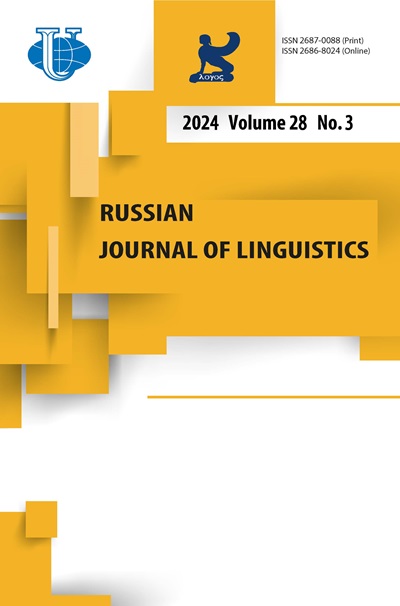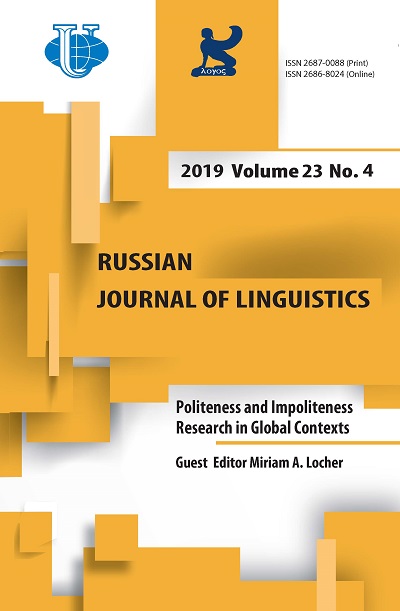Воздействие вежливости на грамматику: личные местоимения первого и второго лица и формы обращения в корейском языке
- Авторы: Ри С.1
-
Учреждения:
- Университет иностранных языков Ханкук
- Выпуск: Том 23, № 4 (2019): Исследование вежливости и невежливости в глобальном контексте
- Страницы: 950-974
- Раздел: Статьи
- URL: https://journals.rudn.ru/linguistics/article/view/22526
- DOI: https://doi.org/10.22363/2687-0088-2019-23-4-950-974
Цитировать
Полный текст
Аннотация
Грамматика постоянно развивается под влиянием дискурсивных тенденций, проявляющихся в использовании языка, что отразилось в понятии «эмерджентная грамматика» ‘emergent grammar’ (Hopper 1987). Данный процесс обусловлен различными дискурсивными потребностями, включающими, в том числе, и необходимость сигнализировать о вежливости, которая считается универсальной категорией (Brown and Levinson 1987). Эта потребность особенно важна в корейском языке, где вежливость грамматикализирована, то есть маркировка вежливости получает не только прагматическое, но и грамматическое оформление. В корейском языке отношение говорящего к собеседнику наиболее четко проявляется: (1) при выборе завершающей предложение частицы, сигнализирующей о степени вежливости (из шести возможных уровней), и (2) выборе формы номинации, например, местоимения и формы обращения. В данной статье представлены результаты диахронического исследования системы форм номинаций в корейском языке, изучающего влияние вежливости на грамматику. Несмотря на высокий уровень грамматикализации маркеров вежливости, система номинаций является крайне нестабильной парадигмой, то есть она не подверглась высокому уровню «парадигматизации» (Lehmann 1995 [1982]). Поскольку корейские формы обращения разнообразны и строго дифференцированы, говорящий нередко избегает их использования, опасаясь, что адресат воспримет его выбор как недостаточно вежливый (почтительный) или что сам акт обращения является невежливым в ситуации, когда обращение можно не употреблять. Кроме того, форма обращения, сопровождающаяся формой почтения (Honorific), из-за частого использования постепенно утрачивает свою значимость. Результаты проведенного диахронического исследования корейских форм обращения выявляют две тенденции: термины обращения [+ Honorific] постоянно обновляются, с тем чтобы компенсировать снижающийся эффект почитания, а формы номинации первого лица обновляются для усиления эффекта самоуничижения [+ Humiliative].
Ключевые слова
Об авторах
Сонга Ри
Университет иностранных языков Ханкук
Email: srhee@hufs.ac.kr
профессор лингвистики Университета иностранных языков Ханкук, Республика Корея 107 Imun-ro, Dongdaemun-gu, Seoul, Republic of Korea
Список литературы
- Brown, Lucien (2015). Honorifics and politeness. In Brown, Lucien and Jaehoon Yeon (eds.). The Handbook of Korean Linguistics. Oxford: Wiley Blackwell, 303-319.
- Brown, Penelope & Stephen Levinson (1987). Some Universals in Language Usage. Cambridge: Cambridge University Press.
- Bybee, Joan L., William Pagliuca & Revere Perkins (1994). The Evolution of Grammar: Tense, Aspect, and Modality in the Languages of the World. Chicago: The University of Chicago Press.
- Choi, Nam-Hee (1996). Kotaykwuke Hyengthaylon [Old Korean morphology]. Seoul: Pagijong Press.
- Davies, Bronwyn & Rom Harré (1990). Positioning: The social construction of self. The Journal for the Theory of Social Behaviour 20 (1), 43-63. doi: 10.1111/j.1468-5914.1990.tb00174.x.
- Enfield, Nicholas J. (ed.) (2002). Ethnosyntax: Explorations in Grammar and Culture. Oxford: Oxford University Press.
- Haiman, John (1994). Ritualization and the development of language. In Pagliuca, William (ed.). Perspectives on Grammaticalization. Amsterdam: John Benjamins, 3-28.
- Haiman, John (1998). Talk is Cheap: Sarcasm, Alienation, and the Evolution of Language. Oxford: Oxford University Press.
- Heine, Bernd (2009). On creativity and grammatical change. Special lecture at the 2009 Discourse Cognitive Linguistic Society of Korea Conference, Seoul.
- Heine, Bernd, Ulrike Claudi & Friederike Hünnemeyer (1991). Grammaticalization: A Conceptual Framework. Chicago: Chicago University Press.
- Heine, Bernd & Tania Kuteva (2002). World Lexicon of Grammaticalization. Cambridge: Cambridge University Press.
- Heine, Bernd & Kyung-An Song (2010). On the genesis of personal pronouns: Some conceptual sources. Language and Cognition, 2 (1), 117-147. doi: 10.1515/langcog.2010.005.
- Heine, Bernd & Kyung-An Song (2012). On the grammaticalization of personal pronouns. Journal of Linguistics, 47 (3), 587-630. doi: 10.1017/S0022226711000016.
- Heine, Bernd & Thomas Stolz (2008). Grammaticalization as a creative process. Sprachtypologie und Universalienforschung (STUF) 61 (4), 326-357.
- Hopper, Paul J. (1987).Emergent grammar. Berkeley Linguistic Society, 13, 139-157.
- Hopper, Paul J. (1991). On some principles of grammaticalization. In Traugott, Elizabeth C. & Bernd Heine (eds.). Approaches to Grammaticalization. Amsterdam: John Benjamins, vol. 1, 17-35.
- Hopper, Paul J. & Elizabeth Closs Traugott (2003). Grammaticalization (2nd ed.). Cambridge: Cambridge University Press.
- Kang, Kil-Woon (2004). Hyangka Sinhaytok Yenkwu [New studies on Hyangka interpretations]. Seoul: Hankook Publisher.
- Kang, Kil-Woon (2010). Pikyoenehakcek Ewensacen [A comparative-linguistic etymological dictionary]. Seoul: Hankook Publishing.
- Kim, Mi-hyoung (1995). Hankwuke Taymyengsa [Korean pronouns] Seoul: Hanshin Publishing.
- Kim, Mi-hyoung (2001). A study on the diachronic change of Korean pronouns. Korean Semantics, 9, 1-47.
- Kim, Ui Su (1998). Kuntaykwukeuy tawupep [The honorification system of Early Modern Korean]. In Hong, Jong-Seon (ed.). Kuntaykwuke Mwunpepuy Ihay [Understanding Early Modern Korean grammar]. Seoul: Pakijong Press, 329-364
- Koo, Hyun Jung (2004). A cognitive analysis of lexicalization patterns of (dis-)honorification in Korean. Korean Semantics, 14, 97-120
- Koo, Hyun Jung (2016). On change of the terms of address between couples during the 70 years of post-colonization as reflected in mass media. Korean Semantics, 51, 85-110. doi: 10.19033/sks.2016.03.51.85
- Koo, Hyun Jung & Seongha Rhee (2013a). On an emerging paradigm of sentence-final particles of discontent: A grammaticalization perspective. Language Sciences, 37, 70-89. doi: 10.1016/j.langsci.2012.07.002
- Koo, Hyun Jung & Seongha Rhee (2013b). “I will do it... but I’m asking you to do it”: On the emergence of polite imperative from promissive. Procedia: Social and Behavioral Sciences, 97, 487-494. doi: 10.1016/j.sbspro.2013.10.263
- Koo, Hyun Jung & Seongha Rhee (2016). Pejoratives in Korean. In Finkbeiner, Rita, J. Meibauer, & H. Wiese (eds.). Pejoration. Amsterdam: John Benjamins, 301-323. doi: 10.1075/la.228.13koo.
- Lee, Ki-Moon (1978). Kwukeuy inching taymyengsa [Korean personal pronouns]. Kwanak Emwunyenkwu, 3, 325-338.
- Lehmann, Christian (1995[1982]). Thoughts on Grammaticalization. Newcastle: Lincom Europa.
- Locher, Miriam A. (2008). Relational work, politeness and identity construction. In Antos, Gerd, Eija Ventola, and Tilo Weber (eds.). Handbooks of Applied Linguistics. Volume 2: Interpersonal Communication. Berlin: Mouton de Gruyter, 509-540.
- Locher, Miriam A. (2018). Politeness. In Chapelle, Carol A. (ed.). The Concise Encyclopedia of Applied Linguistics. Hoboken: John Wiley & Sons, 1-6.
- Martin, Samuel (1992). A Reference Grammar of Korean. Rutland, Vermont: Charles E. Tuttle.
- Nam, Ki Shim & Ko, Yong-Kun (1993). Kwukeuy Thongsa Uymilon [Korean syntax and semantics]. Seoul: Tower Press.
- Narrog, Heiko, Seongha Rhee & John Whitman (2018). Grammaticalization in Japanese and Korean. In Narrog, Heiko, and Bernd Heine (eds.). Grammaticalization from a Typological Perspective. Oxford, Oxford University Press, 166-188.
- Park, Seongjong (1997). Chacaphyokiuy ehwilon [Studies on lexemes represented in the borrowed-writing systems]. Saykwukesaynghwal, 7 (4), 61-77.
- Park, Seongjong (2005). A comprehensive study on Idu in the historical manuscripts of the 16th century. Sengkoknonchong, 36 (1), 49-107.
- Rhee, Seongha (1996). Semantics of Verbs and Grammaticalization: The Development in Korean from a Cross-Linguistic Perspective. Ph.D. dissertation, The University of Texas at Austin. Seoul: Hankook Publisher.
- Rhee, Seongha (2011). Divergent specialization in grammaticalization of native Korean and Sino-Korean spatio-relational terms. Language and Linguistics 50, 171-202.
- Rhee, Seongha (2019). When crudity steps into grammar: The case of Korean auxiliary verbs. Paper presented at the 15th International Cognitive Linguistics Conference, Kwansei Kakuin University, Nishinomiya, August 6-11, 2019.
- Rhee, Seongha & Koo, Hyun Jung (2014). Grammaticalization of causatives and passives and their recent development into stance markers in Korean. Poznań Studies in Contemporary Linguistics, 50 (3), 309-337. doi: 10.1515/psicl-2014-0018
- Rhee, Seongha & Koo, Hyun Jung (2017). Audience-blind sentence-enders in Korean: A discourse-pragmatic perspective. Journal of Pragmatics, 120, 101-121. doi: 10.1016/j.pragma.2017.09.002.
- Sharifian, Farzad (2017). Cultural Linguistics: Cultural Conceptualisations and Language. Amsterdam: John Benjamins.
- Shibatani, Masayoshi (1985). Passive and related constructions. Language, 61, 821-848.
- Shibatani, Masayoshi (1990) The Languages of Japan. Cambridge: Cambridge University Press.
- Sohn, Ho-Min (1999). The Korean Language. Cambridge: Cambridge University Press.
- Song, Jae Jung (2005). The Korean Language: Structure, Use and Context. London: Routledge.
- Song, Kyung-An (2002). Korean reflexives and grammaticalization: A speaker-hearer dynamic approach. Sprachtypologie und Universalienforschung (STUF), 55 (5), 340-353.
- Song, Kyung-An & Bernd Heine (2016). On the role of indirect personal reference in the development of personal pronouns. The Linguistic Association of Korea Journal 24 (1), 1-20. doi: 10.24303/lakdoi.2016.24.1.1.
- Suh, Cheong Soo (2000). Kwuke Ewensacen [A Korean Etymological Dictionary]. Seoul: Bogosa.
- Suzuki, Takao (1976) Language and behavior in Japan: The conceptualization of personal relations. Japan Quarterly, 23, 255-266.
- Sweetser, Eve E. (1988). Grammaticalization and semantic bleaching. Berkeley Linguistics Society, 14, 389-405.
- Traugott, Elizabeth C. (1982). From propositional to textual and expressive meanings: Some semantic-pragmatic aspects of grammaticalization. In Lehmann, Winfred P. & Yakov Malkiel (eds.). Directions for Historical Linguistics: A Symposium. Austin, TX: The University of Texas Press, 245-271.
- Traugott, Elizabeth C. & Richard B. Dasher (2002). Regularity in Semantic Change. Cambridge: Cambridge University Press.
- Yeon, Jaehoon & Lucien Brown (2011). Korean: A Comprehensive Grammar. London: Routledge
- Whitman, John (1999) Personal pronoun shift in Japanese: A case in lexical change and point of view. In Kamio, Akio & K. Takama (eds.). Function and Structure: In Honor of Susumu Kuno. Amsterdam: John Benjamins, 357-386
- Wierzbicka, Anna (1992). Semantics, Culture, and Cognition. New York: Oxford University Press

















